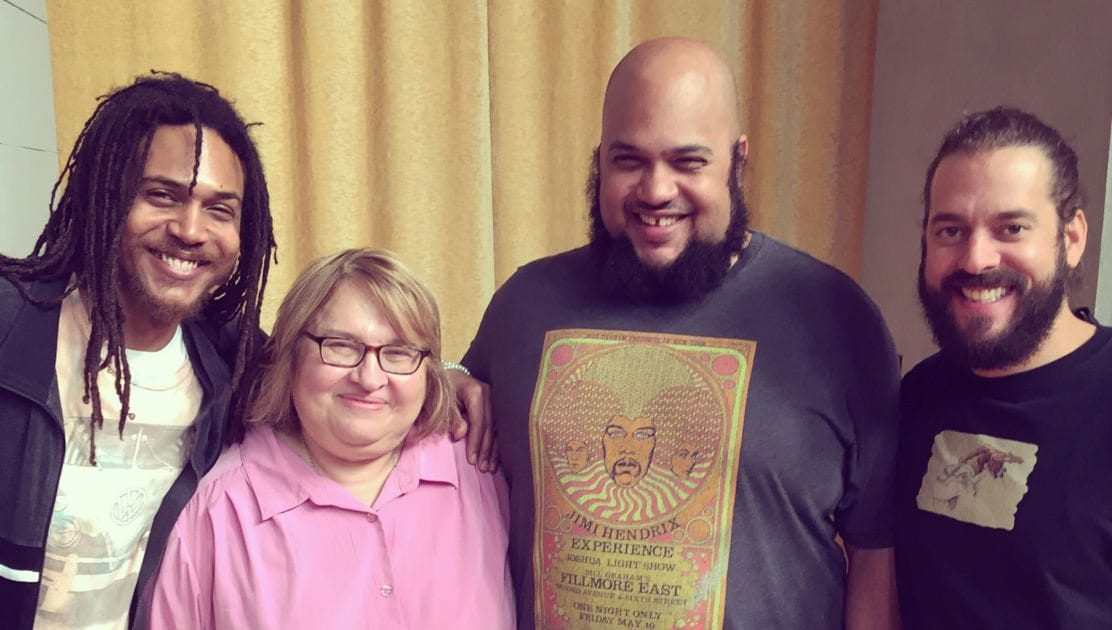“You’re Allowed to Have Fun with the Practice”
An Interview with Ali Smith
Noticing a lack of of access to yoga, mindfulness, and other holistic forms of self-care in their Baltimore neighborhood, brothers Ali and Atman Smith and Andres Gonzalez started the Holistic Life Foundation (HLF) in 2001 with a mission to bring these kinds of practices to people in underserved communities. In an upcoming retreat at the Garrison Institute, “People Who Care for People” (March 10-12), the three HLF cofounders will join meditation teacher Sharon Salzberg to teach contemplative practices and provide caregivers of all kinds an opportunity to recharge physically, mentally, and emotionally.
We recently spoke with HLF cofounder Ali Smith about how contemplation can lead to resilience, his broad definition of the term “caregiver,” and how the inner journey of meditation can be fun.
Do contemplative practices actually help people become more resilient?
A lot of the people that we teach meditation to live in neighborhoods where there’s no peace externally. They live in very violent neighborhoods and homes. There’s no external peace, which leads to a total lack of internal peace and disorder in their lives. Mindfulness is a tool for internal peace. You have a place where you can go inside and find peace, no matter what’s going on outside of you, and no one can ever take it from you once you learn how to get there. Mindfulness can help you become more resilient because it’s one of those things that can help you find internal peace.
You’re not going to be mindful all the time, but there are going to be times when you feel yourself being pulled away from your center because things are going on inside your head or inside your heart. With mindfulness, you can always keep coming back to the center.
In your upcoming retreat at the Garrison Institute, you will focus on teaching mindfulness and resiliency skills to different types of caregivers. Why focus on caregivers?
“Caregivers” is being used in a broad sense and includes people from all walks of life. There will be teachers, social workers, hospice workers, or people who are taking care of a sick parent. Parents are caregivers. A lot of people are caregivers in different ways. You may not consider your 9 to 5 to be a caregiving profession, but a lot of people are caregivers when they get home. That can be very taxing. If you’re constantly giving and giving and giving, you’re going to burn yourself out. You’re not going to be able to serve the people you want to serve if you can’t even take care of yourself.
So, at the retreat, we present self-care tools. It also provides people with the chance to slow down, relax, and connect with other people. You hear what other people are struggling with and discover that you aren’t the only one going through it. You also walk away with some skills that can help you take better care of yourself. We teach yoga and mindfulness—yoga in the broad sense of the term, not just postures. There’s the breath work, the off-the-mat practices, and a lot of meditation.
One thing that seems unique about your approach to teaching meditation is that you make it fun. People in your classes are laughing and having a good time.
We always try to make it fun because no one wants to go back to something that’s lame and boring. When I’m stressed out, I’m not going to go do something that’s boring. If you’re thinking back on the retreat that put a big smile on your face, you’re more likely to go back to those practices that gave you that vibe.
We believe that the whole inner journey, really getting to know yourself, should be a fun journey. Some tough things are going to come up, but you’ve got to have fun doing it or you just won’t do it.
That’s so refreshing to hear. I feel like spiritually inclined people have a tendency to be hard on themselves and, consequently, retreats can feel like somber affairs. How do you keep it fun?
I think it’s just by being ourselves. We’re authentic and fun people. We’re not going to change up who we are just to teach someone meditation. We tell jokes and we try to keep it as light as possible. You don’t have to be a grumpy mindfulness practitioner or a serious, stoic mindfulness practitioner. You’re allowed to have fun with the practice.
I completely agree, but sometimes people come to the practice precisely because they’re incredibly burned out or they’re suffering in really deep ways. So the lighter attitude doesn’t necessarily come naturally.
We definitely try to meet people where they are, but maybe if we’re lighter in spirit that can help them come out of the funk that they’re in. Life kicks your butt. There’s a lot that gets thrown at you, but it is possible to see it as the universe giving you the opportunity to learn about yourself and bounce back even stronger from it.
One of my favorite places that I ever taught at is a drug treatment center. And it was because it was full of people who’ve been beating themselves up spiritually and emotionally—beating up their bodies and minds through drug use. To show them that they can feel good on their own through something as simple as working with the breath was very powerful. We showed them how to slow themselves down so that they can take some really long, slow belly breaths. One lady came out and said, “I don’t have to get high anymore because that was amazing.” It can be that kind of light bulb for people where they realize, “Wow, I have the power to feel good inside myself.”
